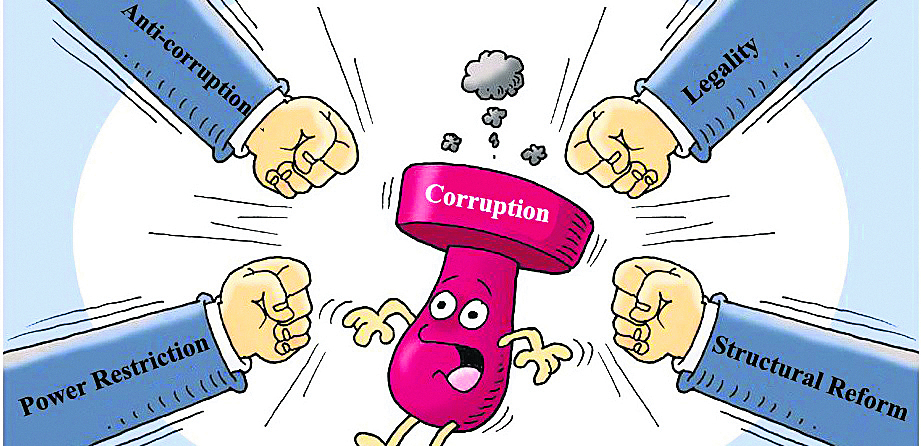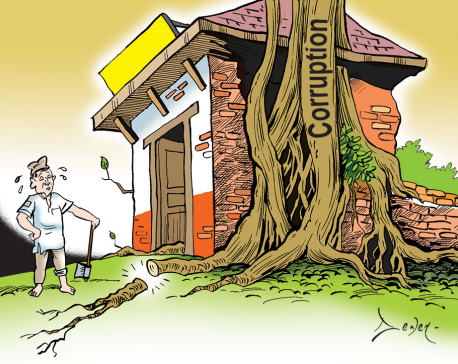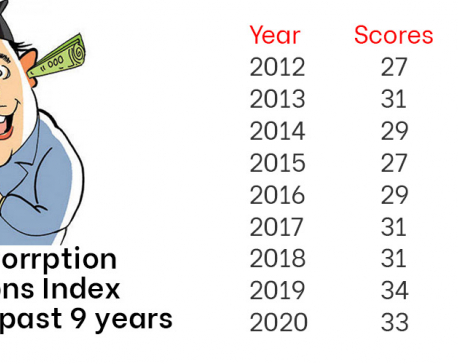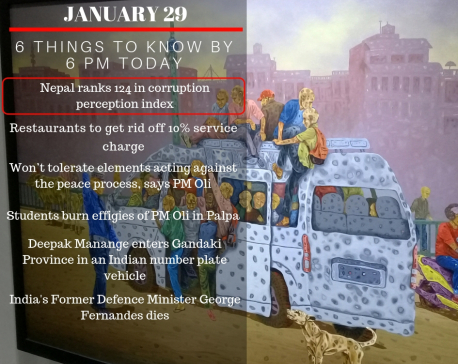
OR
#Editorial
Nepal’s Corruption Crisis
Published On: February 1, 2023 08:37 AM NPT By: Republica | @RepublicaNepal

The latest report of the Transparency International (TI) has once again brought to light the sorry state of affairs in Nepal in terms of endemic corruption. Ranked 110th out of 180 countries, the Corruption Perceptions Index (CPI) shows that Nepal continues to be plagued by corruption at various levels of society even as political parties pledge in their election manifestos to ensure good governance and curb corruption. The fact that Nepal scored 34, up from 33 last year, means that the level of corruption remains almost the same, making Nepal one of the most corrupt countries in the world. This is not just a matter of shame, but a serious hindrance to the country's development and progress. What is particularly concerning is the lack of improvement over the years. Despite repeated promises and efforts from the government to tackle corruption, the situation only seems to be getting worse. The poor CPI score highlights the lack of political will and the absence of accountability mechanisms in the country. This also puts serious questions on the role being played by the Commission for the Investigation of Abuse of Authority (CIAA) to end rampant corruption in the country.
In fact, corruption in Nepal has been systematic in all public offices as well as the political sphere. There is a general perception among the people that they must either be prepared to bribe government officials or be prepared to face unnecessary hassles to get their work done. This is the experience of all common people visiting public offices to avail even basic public services. The level of corruption has increased further with the country embracing a three-tier government. There are 753 local governments, in addition to seven provincial governments and a federal government in place. The existing anti-graft bodies including the CIAA have miserably failed to ensure accountability on the part of the public officials due to lack of adequate human and other resources. The growing corruption has significantly eroded public trust in the government as it has affected all aspects of life, from basic public services such as health and education, to large-scale infrastructure projects and the country’s judicial system. One of the main reasons behind the increasing corruption in the country is the lack of strong political will to control it.
Indeed, corruption of public officials in Nepal continues to be a prominent political concern. The root cause of this lies in the election system itself. The election expenses have soared so high in recent years that an individual candidate spends several millions of rupees although the election-related laws do not allow the candidates to indulge in such profuse spending. This provides incentives for political leaders in power to engage in corruption to recover the expenses made in the election and possibly prepare for another election. Additionally, politics in Nepal has become a profession rather than a social service. Unlike many other western countries, most of the politicians in Nepal have no other profession to make their livelihood. Not surprisingly, they start engaging in corruption once they are in power to make money that is sufficient not just for themselves but for their posterity as well. This trend has increased further as the CIAA has been made defunct with appointment of officials strictly based on political allegiance and judiciary becoming a mere shadow of parliament, especially after the recent cases of impeachment against chief justices. This situation must stop.
The endemic corruption undermines public trust in the government and institutions, and creates an uneven playing field for businesses, stifling economic growth and job creation. Combating corruption is critical not only to ensure fair distribution of resources and opportunities among people, but also to enhance public trust in government institutions, bringing improvement in the delivery of public services. The success to curb corruption also means promoting economic growth and political stability as this plays a key role to bring in foreign direct investment in the country. It is high time for the government and all major political parties to make a resolution to take concrete and effective steps to root out corruption in the country. This requires not just launching investigations, but following through with prosecutions and imposing appropriate penalties. It also means creating a transparent and accountable system that promotes integrity and ethical behavior, and effectively penalizes those who engage in corrupt activities. The onus also lies on the ordinary citizens to end the corruption. All citizens should demand accountability and transparency from their elected representatives and institutions. Together, we must create a culture of zero tolerance towards corruption, and work towards a more fair and just society. Nepal's future depends on the actions we take today. It's time for the country to move beyond just lip-service and take decisive steps to combat corruption and build a brighter future for all.
You May Like This

Bring policy decisions under legal jurisdiction to tame corruption
Nepal has consistently remained in the bottom half of the list of countries where corruption is rampant. This is evident... Read More...

Public perception of corruption rises further in Nepal; the country becomes fourth most corrupt country in South Asia
KATHMANDU, Jan 28: The status of corruption in Nepal has worsened in comparison to last year, as Nepal has ranked... Read More...

JAN 29: 6 things to know by 6 PM today
Your daily dose of missed important news of the day. ... Read More...







Just In
- NRB to provide collateral-free loans to foreign employment seekers
- NEB to publish Grade 12 results next week
- Body handover begins; Relatives remain dissatisfied with insurance, compensation amount
- NC defers its plan to join Koshi govt
- NRB to review microfinance loan interest rate
- 134 dead in floods and landslides since onset of monsoon this year
- Mahakali Irrigation Project sees only 22 percent physical progress in 18 years
- Singapore now holds world's most powerful passport; Nepal stays at 98th











Leave A Comment